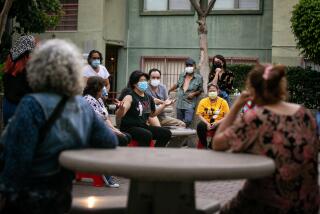Shutting off a benefit may not require notice to tenants
- Share via
Question: The large apartment complex I manage has always provided an outside water faucet and hose for the tenants to use to wash their cars. Over the past few months, some children have been opening the faucet and letting the water run for hours. The property owner has requested that I disable the faucet to make it unusable. Do I have to notify the tenants?
Answer: Landlord/tenant law does not require property owners to provide water for tenants to wash their cars. At best, this feature falls into the category of a tenancy benefit supplied by the landlord.
For tenants on month-to-month agreements, a landlord can remove a tenancy benefit with a 30-Day Change of Terms notice. This notice should be personally served to all tenants. Examples of tenancy benefits are payment of utilities by landlord, use of laundry area or change in pool hours.
If the use of the exterior water faucet was specifically listed on any fixed-term leases or implied by indicating its existence at the time the lease was signed, you will not be able to remove this benefit from those tenants who are still in their lease terms. The benefit can only be removed when a lease is renewed.
In certain rent control or mandatory mediation jurisdictions, removal of an important benefit can be construed as a “service reduction” justifying a rent reduction. It may be easier to regulate the water faucet by controlling the handle or by installing a security lock.
*
Who needs to maintain yard?
Question: For the last three years, my landlord had me work with my neighbor to keep the boundary trees and shrubs trimmed. They are planted in the yard next door. I now have a new job that keeps me out of town a lot and I don’t want this responsibility anymore. Whose job is it to maintain the yard, the tenant or the landlord?
Answer: Whether you or the landlord have responsibility for yard maintenance should be a part of the tenancy rental agreement and should be specified in writing and understood from the beginning. If your agreement does not assign yard or landscaping responsibility to you, then you are not required to continue this task.
Tree trimming can be tricky. California Civil Code section 3346 says the trimmer, in this case you, could be liable for three times the amount of loss if a tree is damaged.
Talk with your landlord and discuss the time constraints you now have, as well as the financial risk you may have.
*
Deposit settled minus trash bill
Question: A tenant moved out two months ago. I returned her full security deposit within the required time. The quarterly garbage bill for the complex just arrived and there is a $30 charge for removing her trash from the property. Can I send her this bill and request reimbursement?
Answer: Once a security deposit is settled, a landlord would have difficulty getting a former tenant to pay additional bills. You have the legal right to pursue a claim unknown to you at the time the deposit was settled, but obtaining a judgment and/or collection may not be easy.
If you have proof that the trash actually belonged to the former tenant, you could send her the bill and then proceed into Small Claims Court to seek reimbursement if she fails to pay. But you may not want to take this route for such a small amount.
Try contacting the tenant and offering a compromise -- perhaps you would agree to pay a portion since the deposit has been returned.
If the two of you do resolve the matter outside of court, it would be a good idea to give her a copy of the bill, and have both of you sign a “full and final settlement” statement to indicate the matter is closed.
*
This column is prepared by Project Sentinel, a rental housing mediation service. Questions may be sent to 1055 Sunnyvale-Saratoga Road, Suite 3, Sunnyvale, CA 94087, but cannot be answered individually.
For housing discrimination questions, complaints or help, call the state Department of Fair Housing and Employment at (800) 233-3212 or the Southern California Housing Rights Center at (800) 477-5977.
More to Read
Inside the business of entertainment
The Wide Shot brings you news, analysis and insights on everything from streaming wars to production — and what it all means for the future.
You may occasionally receive promotional content from the Los Angeles Times.










